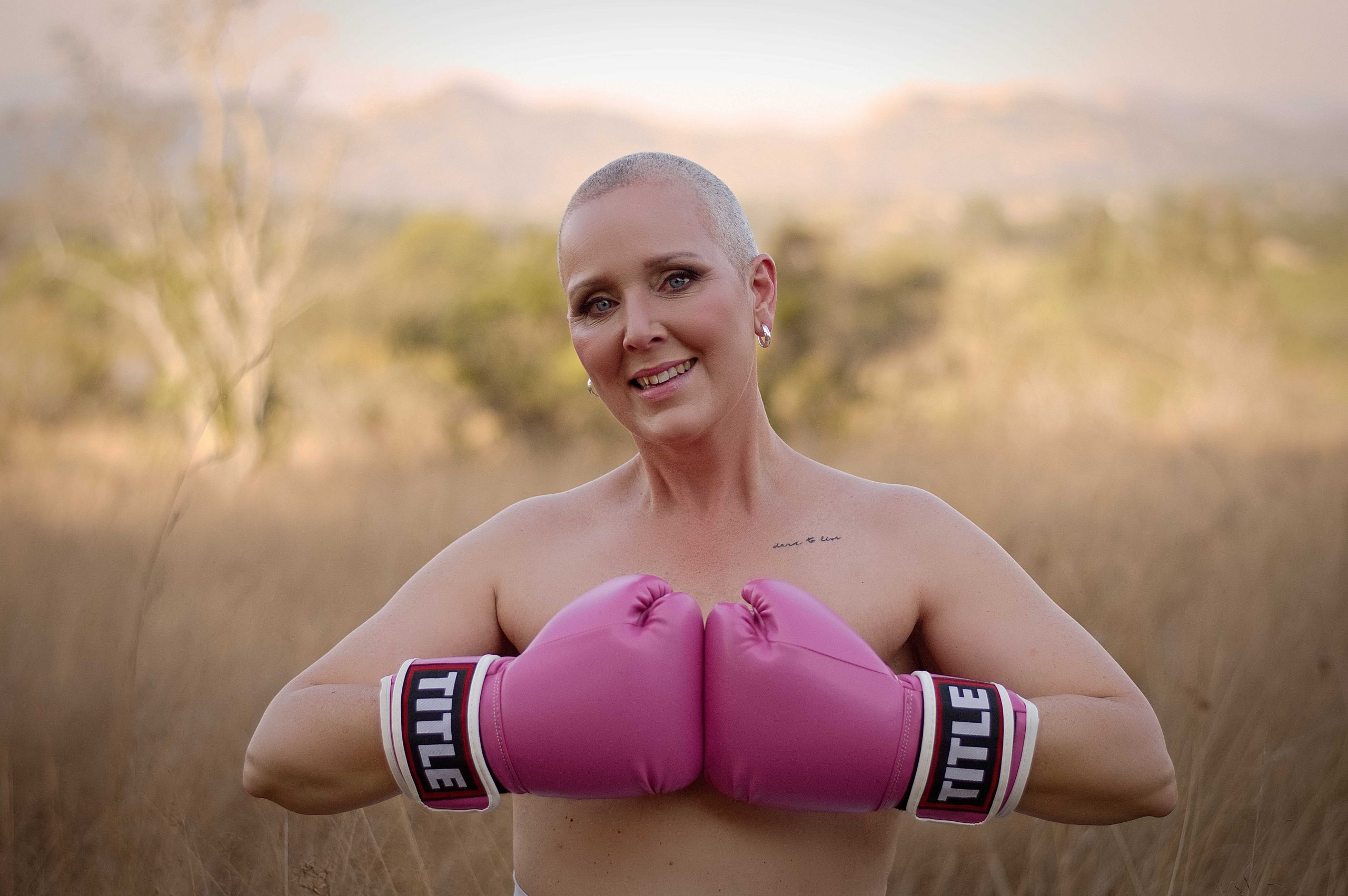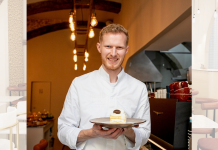We featured well-known cancer survivor Marlene Pretorius two years ago when she was on her way to her seventh operation for breast cancer. We catch up with her to find out how life has been since then.
Get It Lowveld (GIL): When we last spoke, you were on your way to operation number seven (October 2021). Tell us everything that has happened since then?
Marlene Pretorius (MP): The last surgery that October was when I went with a flat aesthetic closure. My chest wall is very tender, and I decided to have the flat closure without reconstruction, so no room or ever changing my mind about having implants again. I have had multiple cysts/nodules appear on my ribs and sternum, and of late on my left collarbone. I have had multiple aspirations (needle procedure to drain fluid from a breast cyst), which are very painful, and the left pectoral muscle pulled up, which is painful as well. You learn to live with the pain and discomfort, and as soon as you feel something new, you just contact oncology and have it checked out. This is my life now, and will be for the next few years, as I am on another five years of Stradexa treatment from November – switching over from Tamoxifen.
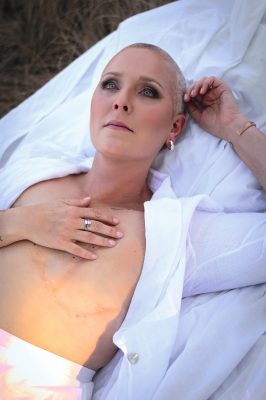
GIL: Looking back since the initial diagnosis, what are the most significant changes you can see?
MP: Goodness, I think you feel like you lose yourself during this process. From hearing the words ‘you have cancer’ to ending up with a flat chest wall, it’s not easy. I am thankful I never had chemotherapy or radiation treatment, but dealing with healing time after time, you learn that everyone’s journey is different. I think the most important changes in me are that I am so much more resilient, braver, than I thought I was. Most importantly, I have learnt that hair and breasts are not what make you a woman, and that you can learn to manage any situation. Not being able to look the way I did before cancer, and to make peace with that, is a massive task. One I get right most days, but being human, I get bad days – on which family support is priceless.
GIL: You are amazing, always involved in cancer awareness programmes, running a business, being a wife and mum … How do you do it?
MP: Multitasking is challenging, but with the right support system, you can handle so much more. I have a wonderful husband and daughter, and friends who carry me and are there on the vloermoer days, encouraging me to keep on going. Exercise is so important too, and I try and make time to even just walk 3km a day, if I have a gap … just to clear my mind again, and give me the dopamine to face the rest of the day. Doing journalling and Bible study gives me the strength daily to get up and try. Even if the day doesn’t go as planned, and I lose myself a few times, tomorrow is a brand-new day, and you have to get up and try again!
GIL: What effect has this had on your family, long-term? They are strong and supportive, but it must be difficult and terrifying for them. How do they cope?
MP: We communicate and hash things out, and I think that is the most important thing to do. I remember when I was first diagnosed, Johan had a colleague whose wife was diagnosed too, but she never told her husband. Johan asked me a few times, “So it’s all
out, eh? Are you sure it did not spread? You will tell me?” and I realised there and then I will always do my tests, I will act on anything I feel differently in my body, and I will go for the scans needed – to give them peace of mind all the time. This is our reality now. We discuss every option, we discuss every surgery. I am so blessed with Johan and Nakita – God gave me the best. We know that recurrence is real, and we know we will stand together and always support one another. It sounds surreal, but we are blessed with such a strong bond.
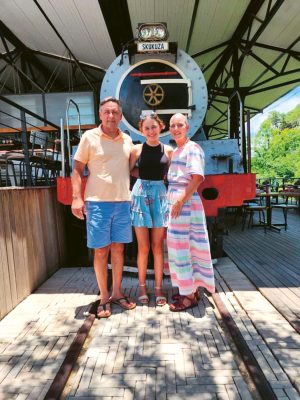
GIL: What do you normally do when you get to spend time together? Any favourite pastimes or places you love to go?
MP: We have an old farmhouse in White River, and the stoep can tell you stories for days … My husband loves braaiing, and the music will be playing, and we dance and sing and just enjoy our family home. We love a Picasso’s lunch on a Sunday afternoon and enjoy the live music. We went on two magical holidays in the past year – Mauritius and the UK – and it was bliss! It was the first time after a hectic three years that we decided to take time out and just go. Due to our busy schedules, time spent on a weekend together is just what we need.
GIL: What has been the most difficult part of your journey and how did you overcome it?
MP: The hardest part for me is making peace with the fact that this is my journey. That I have had side effects of the Tamoxifen treatment, and that I ended up with a flat chest wall and no breast tissue. To say I have overcome it is not true – yet … But I am getting there. Changes to the way I dress, the way I carry myself, the way I have to look after my weight, and the way I have to lift my head high when walking into a room filled with gorgeous women – and know that I am God’s warrior princess, even though I do not fit the ‘normal profile’ that’s acceptable to the world.
GIL: Would you say your priorities have changed?
MP: Absolutely! I used to be in the hair and nail salon every month. There is nothing like having a pamper and walking out of the salon feeling like a million dollars! But recently, I ran out of my foundation, and where I used to have backups in my cupboard, I forgot to buy the foundation for almost two weeks … two weeks! I still went to school, chatted to the mums, went to the shops, and did not even realise I was facing the world without my ‘made-up face’. It’s a small example, but it has a huge impact on so many women. We have this idea of what we need to look like, and if we don’t, the world falls apart … Not for me, anymore. I have learnt that I am enough … as long as I am enough for my family, I am enough!
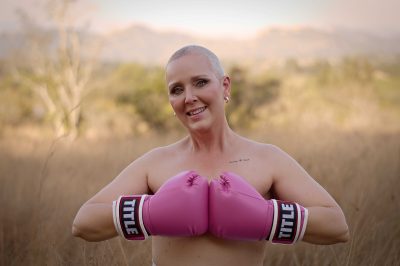
GIL: Is there anything you would do differently if you could go back?
MP: I wish I took a little more time to accept the fact that I was diagnosed. My OCD personality does not allow change … Funny, and here I am, totally changed over a period of five years. How life can just show you! I heard the words ‘you have cancer’ and I immediately knew what I was going to do. After having a mum who had a single mastectomy, and her cancer recurred four times afterwards, I always knew I would do a double mastectomy as soon as I ever got diagnosed. A week after my diagnosis, I had my first surgery – a double mastectomy and direct reconstructive surgery (that failed). From that point on … everything just ran into each other. Check-ups, surgery after surgery. I never took the time to sit and think of my situation and what other options there might be out there. I believe I did the right thing, considering our high family risk, but only now am I working through emotional baggage from the last almost five years. I sometimes just cry, alone, just cry and cry; because I am human, and there are times when I still cannot believe I am on this side of the fence.
GIL: What has been your biggest self-discovery or revelation since your diagnosis?
MP: I never thought I would be brave enough to share my journey. I am a very private person, and always have been. But since my diagnosis, I have started blogs and videos, and just speaking up. I have the option to wear prosthesis and a wig, but I chose not to … this is me. There are so many women going through this dreaded disease, and they are alone, and they need help. I believe that this is God’s testimony. I have to share it. From a girl who never wanted to swim in her costume at school, to a woman who lost hair and breasts and feels confident to share her images and story. If you had to tell me 10 years ago that this was my future, I would have laughed.
GIL: Would you say treatment has advanced since your initial diagnosis? If so, in what way?
MP: I definitely think so, yes. Overall general health and well-being play a massive role, along with treatment. I thank Sarita Retief for the brutal honesty she offered me the first time I met her. She looked and me and said, “Marlene, you need to look after your health, you need to eat well and exercise every day. Your risk is high, but it will elevate with an unhealthy lifestyle and weight.” That is what I have been focusing on. Not easy, and often I slip and pick up weight, but I have to get back up and start again. My mum’s cancer returned in her spine two years ago, and she only received 10 sessions of radiation and is on a treatment that helps her manage her disease – no chemo needed. There are fantastic options out there. You just need to get to the right people and specialists and ask.
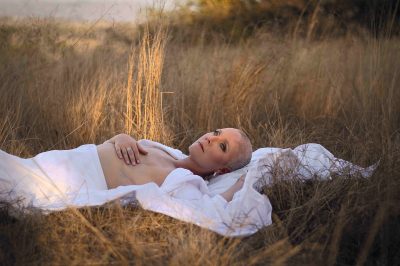
GIL: What advice do you have for anyone going through this?
MP: Breathe … Surround yourself with loving family and friends and support. Take it one step at a time. Communicate with your loved ones. Know you are brave, strong and amazing, and that you will never get dealt a card you cannot handle. Stay positive, and on the bad days, just slip into your PJs, lie on the couch and binge-watch Friends. Tomorrow is a new day … But remember, you only have today to veg – tomorrow, you get up and go again! There is always someone looking at you, at any given time, and being inspired … without you even realising it! Listen to your body, and don’t be scared to verbalise your concerns to your oncologist or specialist.
GIL: What’s next for you?
MP: Ooh, tough one, as our only daughter will be going to matric next year, and then she will go and study and my life will change yet again. I am just focusing on health, family and
business at the moment – as I am sure everyone is doing. My treatment is almost five years in, and the change-over will happen in November, when we will have a transition from Tamoxifen to Stradexa, which will probably present a few challenges during that time, until my body adjusts. This journey is seasonal, and you never know what’s around the corner. But you cannot live in fear, wondering when it will recur. You have to live your life to the fullest, and help others, inspire where you can and just be brave.
Making the right choices when it comes to prevention and early detection
While there is no hard and fast silver bullet to ward off breast cancer, making the correct lifestyle choices can certainly help. A healthy diet and regular exercise are just a part of what you can do to potentially lower your overall risk, not only of breast cancer, but of other serious conditions like heart disease, strokes, diabetes and other cancers.
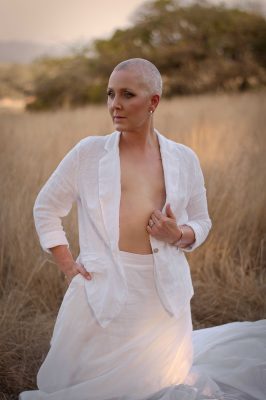
Regular self-exams
Perform monthly breast self-exams to become familiar with your breasts, discuss any unusual changes with your doctor.
Mammograms
Get regular mammograms. These X-ray screenings can pick up breast cancer in its early stages when it’s most treatable.
Healthy diet
Maintain a well-balanced diet rich in fruits, vegetables, wholegrains and lean proteins. Limit meat, saturated fats and processed foods.
Physical activity
Maintain a healthy weight by getting regular exercise. Obesity is associated with a higher risk of breast cancer, especially after menopause.
Limit alcohol consumption
Excessive alcohol consumption has been linked to an increased risk of breast cancer, limit yourself to one drink per day, and try to skip days in between.
Breastfeeding
If you can, consider breastfeeding. Studies show that it may reduce the risk of this cancer.
Hormone therapy
Be cautious when considering hormone replacement therapy for menopause symptoms. Discuss the potential risks and benefits with your healthcare provider.
Family history
If you have close relatives with breast cancer or other risk factors, discuss this with your doctor.
Limit exposure to environmental toxins
Minimise exposure to environmental toxins, such as BPA and phthalates found in some plastics. Use glass or stainless steel containers for food and beverages.
Stress management
Chronic stress may weaken the immune system. Practise stress-reduction techniques such as mindfulness, meditation, breathing exercises or yoga.
Regular check-ups
Don’t skip regular medical check-ups. Early detection is key to successful treatment.
Stay informed
Medical guidelines may change, make sure you are up to date with the latest research and recommendations related to breast cancer prevention.
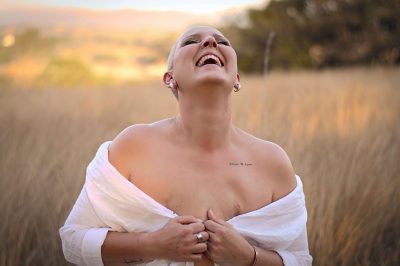
Photographer: Belinda Erasmus of Belle-Grace Photography

